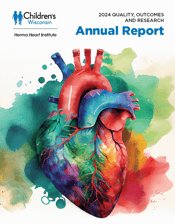View the 2024 report and learn how our investment in research translates into the care we provide.

Herma Heart Institute-Funded Projects
Research spotlight: PTSD Project
Funding the next wave of advancements in congenital heart disease is not always easy. Learn more about the Herma Heart Institute’s commitment to funding future research.
Below are recent fund recipients:
Herma Heart Institute research grants
- Spatial transcriptomic profiling of bicuspid aortic valves — Joy Lincoln, PhD
Herma Heart Institute and Advancing a Healthier Wisconsin pilot grants
- Explore heart muscle cell division and its impact on heart repair– Lu Han, PhD
- Evaluating the efficacy of human recombinant dornase alfa on cell-free DNA — Justinn Tanem, MD
Herma Heart Institute Programmatic grants
- Cord blood component of the precision medicine program — Joy Lincoln, PhD
- ACTION database Epic integration - Robert Niebler, MD
Herma Heart Institute seed grants
- Investigation of pulmonary arterlovenous malformations in single ventricle congenital heart disease — Andrew Spearman, MD
- The role of MYH6 and MPR3 variants in coarctation of the aorta - Aoy Tomita-Mitchell, PhD
Featured Nationally-Funded Projects
Below are just a few of the many nationally-funded projects our team is leading:
Racial and socioeconomic disparities of children at risk for cardiovascular disease in southeast Wisconsin
- Black adults have a higher prevalence of cardiovascular disease, including heart attacks and stroke, compared to white adults in Wisconsin. Many of the pathological changes in blood vessels that ultimately lead to heart attacks and stroke, are present as early as childhood are due to underlying dysfunction of endothelial cells that line the vessel wall. The goal of the study, led by Sal Ginde, MD and Ben Goot, MD, is to measure endothelial function in a diverse group of 300 children ages 8 to 18 and identify racial and socioeconomic factors that are associated with a higher prevalence of endothelial dysfunction.
Exploring the mechanisms promoting human iPSC-derived cardiomyocyte maturation
- Lu Han, PhD, recipient of the 2022 Michael H. Keelan, Jr., MD Scholar award, is advancing her research to better understand the mechanisms that regulate the dynamics of heart muscle (cardiomyocytes) in physiological and pathological growth of the heart in order to advance the development of new treatments for congenital and adult disease.
Dr. Han’s project will endeavor to produce induced Pluripotent Stem Cells (iPSC)-derived cardiomyocytes that closely resemble naturally existing cells within the adult human body in terms of structure and function. These optimized cells will allow scientists to test ideas and develop novel treatments for humans, and hold an enormous promise for personalized medicine, drug testing, and regeneration therapy.
A new diagnostic tool for high-risk pregnancies
- We are in the midst of a four-year NIH-funded study that explores the use of fetal magnetocardiography (fMCG), a potentially more accurate test to detect the highest risk pregnancies with fetal heart defects. Learn more about this study in the Fetal Heart Foundation's Connexions magazine.
Does Piccolo PDA closure improve outcomes in premature infants?
-
The Herma Heart Institute is part of the first national multicenter clinical trial to evaluate treatment of PDA’s in premature infants. The PIVOTAL trial (Percutaneous Intervention versus Observation Trial of Arterial ductus in Low-weight infants) plans to enroll 240 infants across 20 sites in a controlled, randomized study examining medical treatment vs PDA device closure. This study is being co-led by Ted Gudausky, MD FACC FSCAI, a pediatric cardiologist and Vijender Karody, MD, a neonatologist at Children's Wisconsin. This study is sponsored by the National Institutes of Health and led by Nationwide Children's Hospital.
Virtual Health and 3D Technology
The Stanford Virtual Heart
- Developed by Lighthaus Inc. with the support of the Betty Irene Moore Children’s Heart Center at Stanford and Oculus VR, the Stanford Virtual Heart is a cutting-edge virtual reality education tool. The Herma Heart Institute is currently one of 20 pediatric hospitals with The Stanford Virtual Heart. Watch this video to learn how else we’re using the Stanford Virtual Heart at the Herma Heart Institute.
The Heart Summit
- The Heart Summit was an immersive experience that provided unprecedented access to the inside of the operating room. For three years, a group of some of the world’s greatest medical minds come gathered to watch an open-heart surgery live in 3D while interacting in real-time with the surgeon. Read more about our past Heart Summit topics:
3D surgical encyclopedia
- With the help of our 3D camera, we continue to grow our collection of recorded surgical procedures in a 3D format. These recordings will help enhance education and training for the next wave of providers at peer institutions across the world.
Interstage home monitoring app
- Along with being the pioneers of the Interstage Home Monitoring approach, we led the way into the digital frontier by translating the program into a mobile app. This new platform eliminated the need for binders of papers and a flurry of phone calls, and ultimately reduced the stress for parents. Learn about the Interstage Home Monitoring app and other new technologies at our heart center.
Our Congenital Heart Disease Research Labs
Read more about the congenital heart disease research underway at our dedicated research labs:



